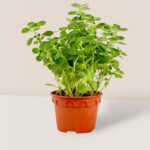Herbs Plant: A Comprehensive Guide to Growing and Using Herbs
What do you mean by Herbs Plant?
Herbs are plants that are used for their aromatic, medicinal, or culinary properties. They are typically small plants that do not produce woody stems, and they are often grown for their leaves, flowers, or seeds. Herbs have been used for centuries in various cultures for their healing properties and as flavor enhancers in cooking.
How to Grow Herbs Plant?

Growing herbs is relatively easy and can be done in a variety of ways. You can grow herbs indoors on a windowsill, in a container on your patio, or in a traditional garden bed. Most herbs prefer well-drained soil and plenty of sunlight, so be sure to choose a location that meets these requirements.
When planting herbs, be sure to space them out according to their size and growth habits. Some herbs, like mint, can be invasive and may need to be contained in their own pot. Water your herbs regularly, but be careful not to overwater as this can lead to root rot. Fertilize your herbs periodically with a balanced fertilizer to promote healthy growth.
What is known about the Benefits of Herbs Plant?
Herbs have a wide range of benefits, both in culinary and medicinal applications. Many herbs are rich in antioxidants, vitamins, and minerals that can help boost overall health and well-being. For example, garlic is known for its immune-boosting properties, while ginger is known for its anti-inflammatory effects.
In cooking, herbs add flavor and depth to dishes, making them more enjoyable to eat. Fresh herbs are often preferred over dried herbs for their vibrant taste and aroma. Some popular culinary herbs include basil, rosemary, thyme, and cilantro.
What are the Solutions for Growing Herbs Plant?
If you are new to growing herbs, start with easy-to-grow varieties like basil, parsley, or chives. These herbs are forgiving and can withstand a variety of growing conditions. Consider starting herbs from seeds or buying starter plants from a nursery to kickstart your herb garden.
Research the specific needs of each herb you plan to grow, as some herbs require more specialized care than others. Consider companion planting herbs with other vegetables or flowers to create a diverse and thriving garden ecosystem. Remember to harvest your herbs regularly to encourage new growth and prevent them from becoming woody or leggy.
Information on Using Herbs Plant in Everyday Life
Herbs can be used in a variety of ways in everyday life, from cooking and baking to making herbal remedies and teas. Fresh herbs add a burst of flavor to salads, soups, and main dishes, while dried herbs can be used to season meats, fish, and vegetables.
Many herbs have medicinal properties and can be used to treat common ailments like colds, headaches, and indigestion. For example, peppermint tea can help alleviate stomach discomfort, while chamomile tea can promote relaxation and sleep. Always consult with a healthcare professional before using herbs for medicinal purposes.
Conclusion
Herbs are versatile plants that can be grown and used in a variety of ways. Whether you are a beginner gardener looking to start an herb garden or a seasoned cook looking to experiment with new flavors, herbs offer endless possibilities. By understanding the basics of growing and using herbs, you can enjoy the many benefits they have to offer in your everyday life.
FAQs
1. Can I grow herbs indoors?
Yes, many herbs can be grown indoors on a sunny windowsill or under grow lights.
2. How often should I water my herbs?
Water your herbs when the top inch of soil feels dry to the touch, usually about once a week.
3. Are all herbs safe to use for medicinal purposes?
Not all herbs are safe for medicinal use, so it’s important to research and consult with a healthcare professional before using herbs for healing.
4. Can I dry herbs for later use?
Yes, many herbs can be dried and stored for later use in cooking or making herbal remedies.
5. What are some easy herbs to grow for beginners?
Basil, parsley, chives, and mint are all easy-to-grow herbs that are perfect for beginners.
